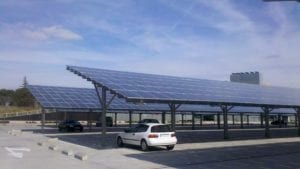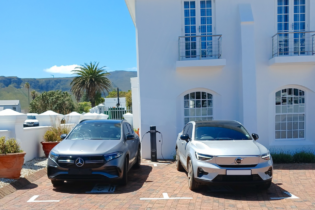South Africa has committed to an energy generation infrastructure development plan for 2010 to 2030, known as the Integrated Resource Plan, which stipulates that the country aims to achieve 9600MW of solar power by 2030. In order to achieve this ambitious milestone, South African businesses will have to play a key role by carefully planning their future energy solutions.
This is according to Manie de Waal, head of the commercial solar division at Energy Partners – a South African energy solutions provider, who says that although photovoltaic (PV) solar solutions are rapidly being rolled out on a commercial scale there is still often confusion about the benefits of solar power and how to use it optimally. “While diesel generators are not a ‘clean’ source of energy, the combination of a diesel generator with a solar PV solution is often the most financially attractive option for businesses looking to safeguard against the effects of load-shedding.” Grid-tied solution De Waal explains that businesses that operate during standard office hours usually require energy during solar “peak-times” – when sunlight is abundantly available – but must be clear that a “grid-tied” solar solution (by far the majority of all commercial systems in South Africa) does not provide backup power during load shedding. “To drive down costs and also ensure continuous supply of power we would often recommend a grid-tied PV solution coupled to a diesel generator. This solution ties into the Eskom power grid and provides power depending on sunlight levels. When load shedding strikes there is a switch over to the generator, which costs are minimised with the support of solar power. Utility costs are therefore decreased while simultaneously providing an uninterrupted power supply.” He adds that the generator will kick in immediately once the power supply is interrupted. “The cost per unit for energy from Eskom is still significantly less than the cost per unit for energy produced by a generator, therefore it is not recommended for businesses to go ‘off-the-grid’ at this stage.” Generators and batteriesIt is important to consider the size of the generator carefully when coupling it to a solar power as there there is a risk of damaging the generator during low load conditions, warns de Waal. “Very specific technology is available and should be implemented when coupling solar power to a generator.”
He explains that there are also solar solutions with battery storage available which enables excess solar power to be stockpiled and utilised when required, for example in the event of a power outage. “Battery technology is however still quite expensive in South Africa at the moment and the leading global battery technology is not ideal for the South African climate and energy situation. Load shedding for example is not a common occurrence in Europe and the USA.” Exploring alternatives Another energy solution to consider in 2016 is the installation of heat pumps. “Hot water production in the industrial sector accounts for a large portion of national energy demand. Heat pumps have the potential to provide hot water at the same temperature while utilising up to 70% less electricity and therefore provides great benefits to organisations with large hot water requirements.” Regardless of the solution selected by the organisation, an imperative action is to draw a clear distinction between the essential and non-essential circuits, explains de Waal. “This process of identifying the most important components of the business is called load management and will ensure that the critical loads remain uninterrupted during load-shedding, thereby improving the resilience and business continuity of the organisation.” “With a vast amount of energy solutions becoming available and more affordable in the country, it is highly recommended for business owners to consult with a reputable energy solutions provider in order to ensure that they do not overspend or implement unnecessary energy solutions. While going ‘off-the-grid’ seems to be a popular concept at the moment it is not the best solution from a practical and financial perspective,” concludes de Waal.






